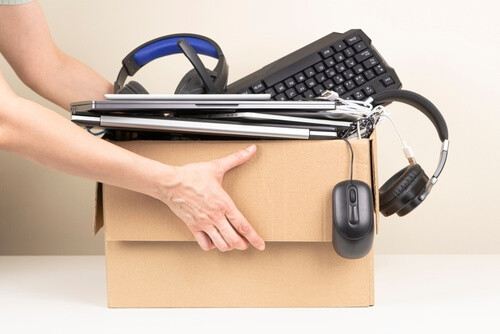It seems like staying current with technology and innovations means we’re ever more frequently upgrading our computers, smartphones and other electronic devices. However, the question of what to do with our old and outdated hardware often lingers.
Properly disposing of computer hardware and devices isn’t just an environmental concern; it’s also a matter of data security. In this comprehensive guide, we will explore various methods and best practices for responsibly disposing of your electronic equipment.
1. Evaluate the Condition
Assess its condition before deciding how to dispose of your hardware or device. Is it still functional? Beyond repair? Consider donating or repurposing it if it’s in working order but simply outdated. It’s time to explore disposal options if it’s no longer functional.
2. Data Security Matters
One of the most critical aspects of disposing of electronic devices is ensuring your sensitive and personal data is thoroughly erased. Data breaches are a significant concern, so taking the precautions to protect your information is essential. Here’s what you should do:
Backup Data
Before you wipe your device, make sure to back up any essential data you want to keep.
Factory Reset
Perform a factory reset to erase your data using the manufacturer’s instructions for your specific device.
Use Data Destruction
Consider using data destruction through a company like RetirePC to ensure data removal beyond recovery. Our shredder can handle thousands of hard drives in an hour, making it impossible for prying eyes to retrieve your data.
Remove Storage Drives
Remove the hard drive or SSD, if you can, and either destroy it or store it securely. This is an extra precaution to prevent data recovery.
3. Recycling
Recycling is an eco-friendly option for disposing of electronic devices. Many components of computers and devices can be recycled, including metals, plastics and glass, following these steps:
Find a Certified Electronics Recycler
Look for certified electronics recycling facilities in your area. These facilities adhere to strict environmental standards and recycle your devices responsibly.
Drop Off or Arrange Pickup
Some recycling centers offer drop-off services, while others may provide pickup options for larger items like desktop computers or TVs.
Know the Regulations
Be aware of local regulations and laws regarding electronic waste disposal. Some areas have specific guidelines for handling electronic waste.
Data Removal Confirmation
Before handing over your device for recycling, confirm with the recycling center that they have secure data erasure procedures in place.
4. Donations and Repurposing
If your old device is still functional, consider donating it or finding a new purpose. Many people and organizations could benefit from your old hardware.
Donate to Charities
Many charitable organizations accept donations of used electronics, especially in working condition. These devices can be given to those in need or used in educational programs.
Local Schools and Nonprofits
Contact local schools, community centers or nonprofits to inquire if they could use your old devices for educational or charitable purposes.
Repurpose the Hardware
If your device is no longer suitable for its original purpose, consider repurposing it. An old smartphone can be turned into a security camera, for example, or a dedicated music player.
5. Trade-In and Buyback Programs
Some manufacturers and retailers offer trade-in and buyback programs for your devices. These programs allow you to exchange an old electronic device for credit toward a new one.
Here’s what you need to know:
Check with the Manufacturer
Contact the manufacturer of your device or visit their website to see if they have a trade-in program. Some companies offer incentives to encourage recycling.
Retailer Programs
Many electronics retailers also have trade-in programs, which you can find with an online search. You can bring your old device to their store or mail it in for evaluation.
At RetirePC, we will gladly buy your old electronics. Just be aware that we can only purchase them at their current market value. So, holding on to old electronics for a prolonged period could hamper your financial gains during a sale.
Consider the Value
The value of your old device may vary depending on its age and condition. Newer devices may have a more substantial trade-in value.
6. E-Waste Events and Collection Drives
In some areas, you may find electronic waste (e-waste) collection events or drives organized by local governments or environmental organizations. These provide a convenient way to dispose of old electronics responsibly. Here’s how to participate:
Check Local Events
Keep an eye out for e-waste collection announcements in your community. These events are often held periodically.
Drop Off Your Electronics
On the designated day and location, drop off your old electronics for proper disposal or recycling. These events usually have professionals on hand to handle the recycling process.
Support Environmental Causes
By participating in e-waste collection events, you contribute to responsible electronic waste management, reducing its environmental impact.
7. Dispose of Non-Recyclable Parts Properly
While many components of electronic devices are recyclable, some parts may not be. Batteries, for instance, require specific disposal methods. Here’s what to do:
Batteries
Dispose of batteries at designated battery recycling locations. Many electronics retailers have collection bins for batteries.
Printer Ink Cartridges
Printer ink cartridges can be recycled through manufacturer-sponsored programs or at office supply stores.
Accessories
Old cables, chargers, and other accessories can often be recycled as e-waste or through designated recycling programs.
9. Be Mindful of Hazardous Materials
Electronic devices contain hazardous materials, or e-waste, like lead, mercury, and cadmium. These can be poisonous and harmful to the environment if not disposed of properly:
Follow Guidelines
When recycling or disposing of electronic devices, ensure that hazardous materials are managed according to local regulations and guidelines.
Professional Assistance
Ask a certified electronics recycling center or waste management facility for help if you’re unsure about handling hazardous materials.
10. Reduce, Reuse, Recycle
Responsible disposal of computer hardware and electronic devices is essential for both the environment and data security. Remember the three R’s: Reduce, Reuse, and Recycle.
Reduce electronic waste by upgrading only when necessary, reuse devices if they are still functional, and recycle them when you can no longer use them.
Step Into Your Future With RetirePC
By following the steps and guidelines in this comprehensive guide, you can contribute to a cleaner environment and responsibly protect your personal data while disposing of your electronic devices. Make informed choices and be a part of the solution to the growing challenge of electronic waste. RetirePC is certified as an electronics recycler, and we’re happy to pay for your old electronics.
Contact us to learn more about our recycling services.


